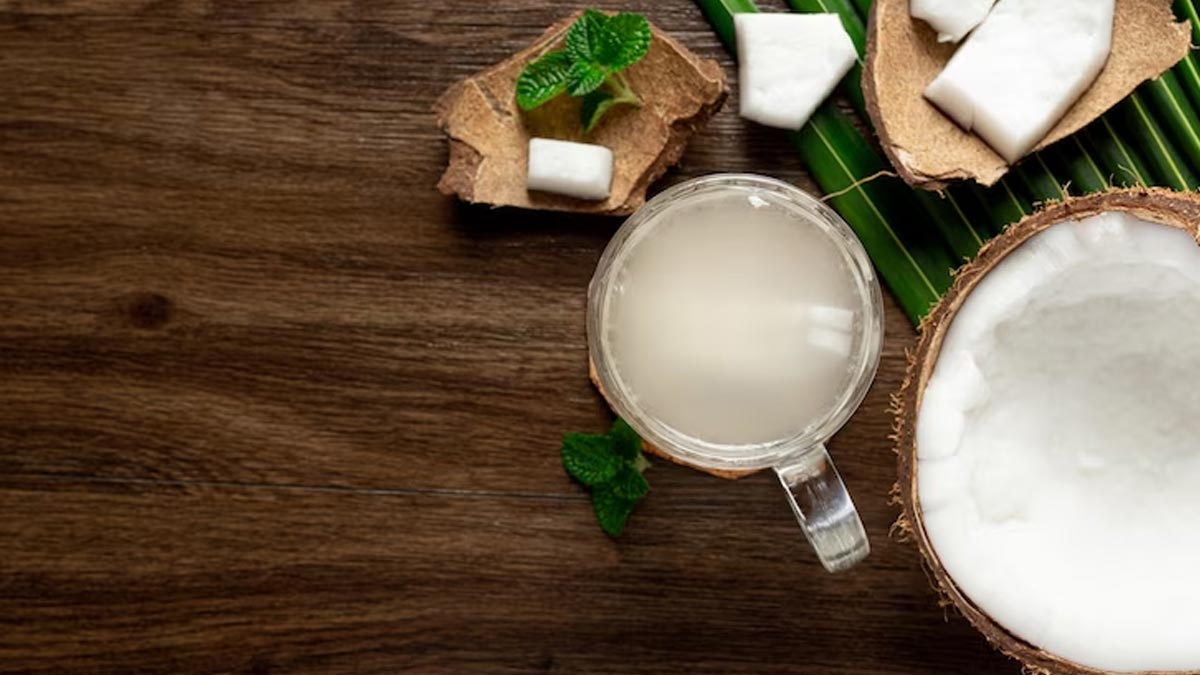
Coconut water, the clear liquid found inside young green coconuts, has surged in popularity as a natural alternative to sugary sports drinks and artificial beverages. Hailed for its hydrating properties and electrolyte content, it's often marketed as a health elixir. But for those mindful of their blood sugar levels, a crucial question arises: is there a healthy connection between coconut water and blood sugar?
Table of Content:-
In an exclusive interaction with our expert, Dr Bhumesh Tyagi, Consultant, General Medicine and Physician, Shardacare - Health City, helped us cut to the benefits and what you should know. Here is what he shared with us.
Nutritional Benefits Of Coconut Water
Before we assess its impact on blood sugar, it's helpful to understand what's in coconut water. Unlike coconut milk or oil, which are high in fat, coconut water is primarily water, carbohydrates (sugars), and electrolytes. A typical 8-ounce serving of pure coconut water contains:
- Calories: 45-60
- Carbohydrates: 10-15 grams (naturally occurring sugars like glucose, fructose, and sucrose)
- Sugars: 8-12 grams
- Potassium: 400-600 mg (more than a banana!)
- Sodium: 25-60 mg
- Magnesium, Calcium, and Phosphorus: Smaller amounts
It's this unique electrolyte profile, particularly its high potassium content, that makes it an excellent hydrator, especially after exercise.

Also Read: Can Eating Too Much Vegetables Be Harmful For Your Health? Expert Shares Why
Connection Between Coconut Water and Blood Sugar
Here's where it gets interesting for blood sugar management. While coconut water does contain natural sugars, its glycemic index (GI) is generally considered to be in the low to moderate range. The GI is a measure of how quickly a food raises blood sugar levels.
- Natural Sugars vs. Added Sugars: The sugars in coconut water are naturally occurring, not added. This is a significant distinction. Added sugars, prevalent in many processed beverages, contribute to rapid blood sugar spikes and offer little nutritional value.
- Electrolyte Advantage: The presence of electrolytes like potassium and magnesium may play a role in how the body processes these sugars. Some research suggests that adequate potassium intake can support insulin sensitivity, a key factor in blood sugar regulation. Magnesium is also known to be involved in glucose metabolism.
- Hydration Benefits: Staying well-hydrated is crucial for overall health, including blood sugar control. Dehydration can sometimes lead to higher blood sugar concentrations. Coconut water, with its excellent hydrating properties, can contribute positively here.
Potential Benefits for Blood Sugar (with caveats)
While research is ongoing, some studies and observations suggest potential benefits related to coconut water and blood sugar, especially in specific contexts:
- Improved Hydration: For individuals who might choose sugary sodas or fruit juices when thirsty, plain coconut water offers a healthier, lower-sugar alternative for hydration, potentially leading to better blood sugar management in the long run.
- Electrolyte Replacement: For individuals with diabetes who are physically active, replacing electrolytes lost during exercise with coconut water might be a better choice than sports drinks loaded with high-fructose corn syrup.
- Nutrient Boost: It offers essential minerals that support overall metabolic health, which indirectly benefits blood sugar regulation.

Also Read: Multiple Sclerosis Risk: What Is The Age Of Onset?
Important Considerations and Who Should Be Cautious
Despite the potential benefits, Dr Tyagi noted that it's crucial to approach coconut water consumption with awareness, especially if you have diabetes or are closely monitoring your blood sugar:
- It Still Contains Sugar: While natural, the sugars in coconut water can still raise blood sugar levels, especially if consumed in large quantities.
- Portion Control is Key: An 8-ounce serving is typically recommended. Guzzling large bottles of coconut water throughout the day could lead to an unwanted increase in blood sugar.
- Monitor Your Own Response: Everyone's body reacts differently. If you have diabetes, it's wise to monitor your blood sugar levels after consuming coconut water to understand its specific impact on your body.
- Choose Pure, Unsweetened: Always opt for pure, unsweetened coconut water. Many commercially available coconut water products have added sugars, flavorings, or other ingredients that can negate any health benefits. Read the label carefully!
- Not a Miracle Cure: Coconut water is not a treatment for diabetes or a substitute for medication. It should be consumed as part of a balanced diet and healthy lifestyle.
- Kidney Issues: Individuals with kidney problems should consult their doctor before increasing their intake of potassium-rich foods and beverages like coconut water.
Bottomline
There can be a healthy connection between coconut water and blood sugar, particularly when it's consumed in moderation as a natural, hydrating alternative to more sugary beverages. Its electrolyte profile and natural sugars make it a better choice than many processed drinks.
However, it's not a free pass. For individuals managing blood sugar levels, awareness of its sugar content and portion control are paramount. Think of it as a healthier choice within a balanced diet, not a beverage that will magically lower blood sugar.
[Disclaimer: Always consult with your doctor or a registered dietitian for personalised advice, especially if you have a health condition like diabetes. They can help you determine how coconut water can fit into your individual dietary plan safely and effectively.]
Also watch this video
How we keep this article up to date:
We work with experts and keep a close eye on the latest in health and wellness. Whenever there is a new research or helpful information, we update our articles with accurate and useful advice.
Current Version